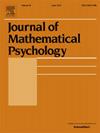A Boolean generalization of the information-gain model can eliminate specific reasoning errors
IF 1.5
4区 心理学
Q2 MATHEMATICS, INTERDISCIPLINARY APPLICATIONS
引用次数: 0
Abstract
In the Wason selection task, subjects show a tendency towards counter-logical behaviour. Evidence gained from this experiment raises questions about the role that deductive logic plays in human reasoning. A prominent explanation of the effect uses an information-gain model. Rather than reasoning deductively, it is argued that subjects seek to reduce uncertainty. The bias that is observed is seen to stem from maximizing information gain in this adaptively rational way. This theoretical article shows that a Boolean generalization of the information-gain model is potentially considered the normative foundation of reasoning, in which case several inferences traditionally considered errors are found to be valid. The article examines how this affects inferences involving both over-extension of logical implication and overestimation of conjunctive probability.
信息增益模型的布尔广义化可以消除特定的推理错误
在瓦森选择任务中,受试者表现出反逻辑行为的倾向。从该实验中获得的证据提出了演绎逻辑在人类推理中所扮演角色的问题。对这一效应的一个重要解释是使用了信息增益模型。有人认为,受试者不是在进行演绎推理,而是在寻求减少不确定性。观察到的偏差被认为源于以这种适应性理性方式最大化信息增益。这篇理论文章表明,信息增益模型的布尔广义化有可能被视为推理的规范基础,在这种情况下,一些传统上被认为是错误的推理被认为是有效的。文章探讨了这对涉及逻辑蕴涵的过度扩展和连接概率的高估的推理有何影响。
本文章由计算机程序翻译,如有差异,请以英文原文为准。
求助全文
约1分钟内获得全文
求助全文
来源期刊

Journal of Mathematical Psychology
医学-数学跨学科应用
CiteScore
3.70
自引率
11.10%
发文量
37
审稿时长
20.2 weeks
期刊介绍:
The Journal of Mathematical Psychology includes articles, monographs and reviews, notes and commentaries, and book reviews in all areas of mathematical psychology. Empirical and theoretical contributions are equally welcome.
Areas of special interest include, but are not limited to, fundamental measurement and psychological process models, such as those based upon neural network or information processing concepts. A partial listing of substantive areas covered include sensation and perception, psychophysics, learning and memory, problem solving, judgment and decision-making, and motivation.
The Journal of Mathematical Psychology is affiliated with the Society for Mathematical Psychology.
Research Areas include:
• Models for sensation and perception, learning, memory and thinking
• Fundamental measurement and scaling
• Decision making
• Neural modeling and networks
• Psychophysics and signal detection
• Neuropsychological theories
• Psycholinguistics
• Motivational dynamics
• Animal behavior
• Psychometric theory
 求助内容:
求助内容: 应助结果提醒方式:
应助结果提醒方式:


